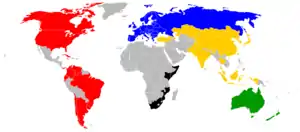International Orienteering Federation
The International Orienteering Federation (IOF) is the international governing body of the sport of orienteering. The IOF head office is located in Karlstad, Sweden.[1]
.png.webp) | |
 Map of the members of the IOF according to their region. | |
| Abbreviation | IOF |
|---|---|
| Formation | May 21, 1961 |
| Type | Federation of national sports associations |
| Headquarters | Drottninggatan 47 3-1/2 tr Karlstad Sweden |
Region served | Worldwide |
Membership | 76 national federations |
President | Leho Haldna |
Secretary General | Tom Hollowell |
| Affiliations | International Olympic Committee |
| Website | www |
The IOF governs four orienteering disciplines: foot orienteering, mountain bike orienteering, ski orienteering, and trail orienteering.[2]
History
The IOF was founded on 21 May 1961 at a Congress held in Copenhagen, Denmark by the orienteering national federations of Bulgaria, Czechoslovakia, Denmark, the Federal Republic of Germany, the German Democratic Republic, Finland, Hungary, Norway, Sweden and Switzerland.[3] By 1969, the IOF represented 16 countries, including its first two non-European member federations representing Japan and Canada,[4] and in 1977 the IOF was recognised by the International Olympic Committee.[3]
Membership
As of January 2016, the membership of the IOF comprises 80 national orienteering federations, of which 56 are members, 24 are provisional members,[5] divided into six geographical regions.[6]
Asia
17 Members, 1 Provisional Member
|
|
Europe
40 Members
|
|
|
Governance structure
The IOF is governed by an elected Council consisting of a President, a Senior Vice President, two Vice Presidents, and seven other Council members.[8] Day-to-day operations of the IOF are the responsibility of the IOF Secretary General.[1] Several standing commissions of the IOF are responsible for the development of the sport worldwide. These commissions include: Foot Orienteering, MTB Orienteering, Ski Orienteering, Trail Orienteering, Environment, IT, Map, Medical, and Rules.
Presidents[9][10]
- Erik Tobé (1961—1975)
- Lasse Heideman (1975—1982)
- Bengt Saltin (1982—1988)
- Heinz Tschudin (1988—1994)
- Sue Harvey (1994—2004)
- Åke Jacobson (2004—2012)
- Brian Porteous (2012—2016)
- Leho Haldna (2016—)
Affiliations
Since 1977, the IOF has been recognised by the International Olympic Committee.[3]
The IOF is also a member of the following organisations:[3]
Publications
The IOF publishes a wide variety of journals and reference works related to the sport. These include Orienteering World, an annual magazine, The Scientific Journal of Orienteering, the OZine,[11] and official editions of the rules of IOF sanctioned orienteering[12] and specifications for orienteering maps.[13]
References
- "Secretariat". International Orienteering Federation. Archived from the original on 2011-06-26. Retrieved 2011-08-02.
- "About the IOF". International Orienteering Federation. Retrieved 2011-08-02.
- "History". International Orienteering Federation. Retrieved 2011-08-02.
- Dandenong Ranges Orienteering Club. "Orienteering History". Momentech Software Services. Archived from the original on 2006-01-08. Retrieved 2006-02-19.
- "National Federations". International Orienteering Federation. Retrieved 2011-08-02.
- "Regions". International Orienteering Federation. Retrieved 2011-08-02.
- "lof.lv". Archived from the original on 2010-04-20. Retrieved 2013-05-13.
- "Council". International Orienteering Federation. Retrieved 2011-08-02.
- "Past and present Councils". IOF. Retrieved 2013-12-23.
- "Leho Haldna from Estonia is the new IOF President". IOF. Retrieved 2017-08-04.
- "Publications". International Orienteering Federation. Retrieved 2011-08-02.
- "Rules". International Orienteering Federation. Retrieved 2011-08-02.
- "Mapping". International Orienteering Federation. Archived from the original on 2011-08-17. Retrieved 2011-08-02.